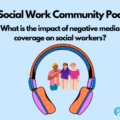
 Community Care’s Choose Social Work campaign aims to counteract the negative media coverage of the profession, and show the brilliant work social workers do every day.
Community Care’s Choose Social Work campaign aims to counteract the negative media coverage of the profession, and show the brilliant work social workers do every day.
Read about why we’re launching this campaign, and the five steps you can take to support it.
In July, as part of our Choose Social Work campaign, we published an interview with Sharon Shoesmith, director of education and children’s services at Haringey Council when the Peter Connelly case (known at the time as Baby P) hit the headlines.
Shoesmith discussed why social workers are so often the focus of media and public blame when a child who is known to children’s services dies, and gave some practical advice about what social workers could do to speak out and improve the perception of the profession.
Here we expand on the ways social workers can take action with an edited extract from Shoesmith’s book, Learning from Baby P: The politics of blame, fear and denial, published by Jessica Kingsley Publishers:
Talk about what you do
- Be proactive about being a social worker – speak up and tell people you meet socially and be proud of your profession.
- Get together more often with police and health colleagues to share learning and to ensure that the social work role is understood.
- Contribute to local forums that the council may already run or seek other local groups where contributions could be made.
- Attend community events and give information about social work at events where services such as the Red Cross, RNLI, the fire service have a presence.
Photo: Icons-Studio/AdobeStock
- Find out how social work is portrayed in careers lessons (is it featured at all?), and go and speak to year 10 students and sixth formers who are thinking about career choices – go back to your old school and to local schools.
- Put information about children into the general information that councils give to residents, eg we have x number of children, x % attend early years, x% primary schools, x% secondary schools and x% go to university/college. We look after x% of our children who cannot be supported in their own families and we have the services of x foster carers and x qualified social workers.
Influence the media
- Encourage and support the British Association of Social Workers to speak out against misleading stories about social workers – you don’t need to know the facts but simply lobby for a ‘fair hearing’ for social workers.
- Be proactive in correcting items in the media when they get it wrong.
- Approach local press and arrange for positive material about the work of social workers, for example, ‘A day in the life of…’.

Photo: Daniel/AdobeStock
- Improve and encourage media coverage of events such as Foster Care Fortnight, ideally co-ordinated across the country.
- Ensure a steady supply of press releases to local newspapers; also use social media to communicate successes.
- Support those using services to link with the local media to tell their story.
- Consider a ‘supporting parents with parenting’ column in a local newspaper with different weekly contributors – approach the local paper and discuss how this might work. Also think about some more serious pieces, for example, the stress about missing a child being harmed, and develop this on the theme of looking out for children is everyone’s business.
- Research how to influence TV scripts to improve the portrayal of social workers.
- Think about taking part in high profile documentary (fly-on-the-wall) programmes.
- Think about writing children’s books (My social worker; My foster mum) and find local authors and illustrators or approach art/literature university departments for their help.
Think big

Photo: jozefmicic/AdobeStock
- Explore how social work might have a better professional footing, for example, ‘the Royal College of…’ as in the medical profession.
- Finally, find the right context and develop the courage to speak about what is unspoken.





 Assistive technology and dementia: practice tips
Assistive technology and dementia: practice tips  A trauma-informed approach to social work: practice tips
A trauma-informed approach to social work: practice tips 




 Find out how to develop your emotional resilience with our free downloadable guide
Find out how to develop your emotional resilience with our free downloadable guide  Develop your social work career with Community Care’s Careers and Training Guide
Develop your social work career with Community Care’s Careers and Training Guide  ‘Dear Sajid Javid: please end the inappropriate detention of autistic people and those with learning disabilities’
‘Dear Sajid Javid: please end the inappropriate detention of autistic people and those with learning disabilities’ Ofsted calls for power to scrutinise children’s home groups
Ofsted calls for power to scrutinise children’s home groups Seven in eight commissioners paying below ‘minimum rate for home care’
Seven in eight commissioners paying below ‘minimum rate for home care’
 Facebook
Facebook X
X LinkedIn
LinkedIn Instagram
Instagram
Thank you for outlining the practical things we all should have on our agenda to some degree. Let’s all get behind Social Work & take small steps to begin to combat those negative stereotypes.
Please watch & share this: https://youtu.be/RT94BA6ytso?si=GmSCKSg6HgABIH86
#strongertogether
#BeProud.BePartOfIt
#choosesocialwork
#Yes2SocialWork
#NorthernIrelandSocialWork
Can I make a couple of suggestions, this is not out of criticism or disrespect to anyone.
I truly believe social workers are professionals who should feel able to challenge decision-making on a professional basis without instinctively being made the subject of blame or forced to leave because they express a view. This step begins in the workplace.
The organization should demonstrate to the public and its workforce that all social workers regardless carry out an important role in safeguarding children. The same level of support, investment, acknowledgment, and respect should be demonstrated across the board, we all have something to contribute to the well-being of vulnerable children and families!! This begins in the workplace.
When recruiting new social workers should this not reflect the diversity of the workforce and those families and children we all work so hard to protect and safeguard? Sociality is made up of many cultures.
If I were a young student or a young person in high school considering investing my time in training to become a social worker, I would want to see someone who reflects me as a young child or vulnerable teenager, who may have the same skin complexion, who can relate to my experiences, and therefore be a voice for me. When recruiting perhaps a group of potential social workers from different walks of life and cultures together would inspire others to invest in social work if they believed they too mattered and are taken seriously in the recruitment process.